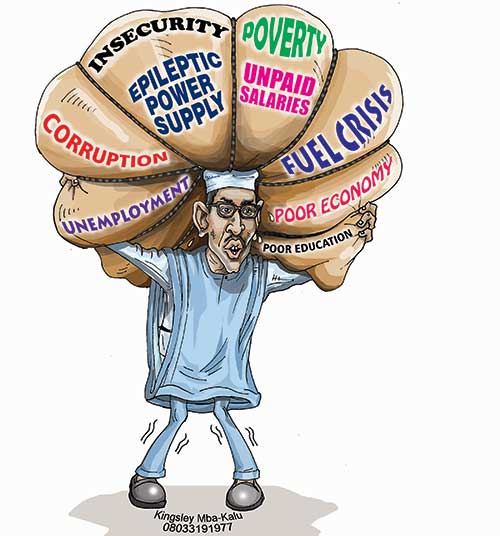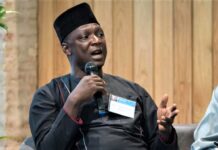Muhammadu Buhari, the man creating multiple records, returns to the saddle on Friday, May 29 with applause, and with high expectations on the shoulders of the gangling 72 year-old who drops his General title but must rule as a military tactician to rescue Africa’s most populous nation from lockdown.
Folks expect him to bust corruption, fix power supply, diversify and grow the economy, supply fuel, provide education, create jobs, develop agriculture, provide housing, send criminals to jail, restore national pride, and do more. A tall order.
Integrity, respect
Buhari’s integrity earns him enormous public respect. Nigerians will give him time to deliver.
Nonetheless, he is aware that his country people, 170 million of them, at home and in the diaspora, are a vocal lot who will tell him off to his face if he fails to get a grip on problems and on the men of dodgy reputation burrowing into his inner circle.
He makes history as the first man in Nigeria to defeat an incumbent present in a ballot. But this comes with burden for his administration.
Metamorphosis to APC
Buhari was Head of State from December 1983 to August 1985, and had contested in vain in three presidential elections under innocuous opposition platforms.
The merger of his one-man-fire-brigade Congress for Progressive Change (CPC), All Nigeria Peoples Party (ANPP), and Action Congress of Nigeria (ACN) into the All Progressives Congress (APC) was the charm in his victory on March 28.
The APC has made several promises – including free meals for primary school pupils, social allowance for graduates of the National Youth Service Corps (NYSC) for one year, stable electricity, effective educational system, stamping out corruption, finishing off Boko Haram that terrorises the North East.
The days of talking are over.
From this Friday, Nigerians want to see signs the APC is moving towards actualising these promises.
“They have to make impact in terms of fulfilling their electoral promises to the Nigerian people.
“In the next six months or one year, they should put emphasis on making some practical impacts so that when they stabilise as a ruling party, people may start considering that this is better than what we voted out,” said Tunde Oseni, a lecturer at the department of politics and international relations, Lead City University, Ibadan.
But how Buhari can manage the varied interests that contributed to his victory is a significant problem.
Taming corrupt associates
Buhari’s anti-corruption effort will be judged not just by the records of his cabinet ministers and aides, but also by taming his associates whom many see as political entrepreneurs.
They may not nominate themselves into office because of their public profile but plant their stooge who, at face value, fit into Buhari’s ideal candidates. He must be wary of them.
He also has to rejig the Economic and Financial Crimes Commission (EFCC) which has been seen as ineffective and selective in prosecuting corrupt persons.
The Independent Corrupt Practices and related offences Commission (ICPC) should be scrapped because it duplicates the functions of the EFCC.
Signs of trouble
There are signs of trouble in the APC over who gets what job. The party is split into cliques on the choice of Senate president and House of Representatives speaker. Political godfathers in the party are reportedly in combat mood to have their candidates named ministers or pull the roof.
For Buhari, the real politics has just started.
He has imposed conditions for getting positions in his government – declaration of assets and a record free of corruption.
“All those that were governors, ministers, permanent secretaries, heads of foreign staff, and all those with political appointments will have to declare their assets on the assumption of their appointment and definitely with the courts.
“And once they leave they have to re-declare their assets,” he said.
“Corruption will have no place and the corrupt will not be appointed into my administration.”
Nigerians are eager to see Buhari walk his talk.
Pressure has been mounting from divergent camps, including governors and governors-elect, to foist a ministerial list on him.
He is trying to manage the situation not to descend into a fiasco, as it did in Enugu where the governorship candidate, Okey Ezea, and APC Vice Chairman (South East), Emma Eneukwu, engaged in a brawl over Abuja jobs.
Contenders for the Senate presidency are also splitting the party.
For now, three candidates – Bukola Saraki, George Akume, and Ahmed Lawan – have shown interest.
Lawan is believed to be the candidate of Bola Tinubu, APC national leader. But a clique is resisting Lawan because of fears he may be subservient to the Jagaban Borgu, as Tinubu is fondly called by admirers.
“We want an independent minded person like Saraki who can challenge even his party’s leadership. Not a yes sir man,” said a PDP senator-elect, who did not want his name in print.
Saraki, former Kwara Governor, has alleged conspiracy against his candidacy by APC hawks who want to exploit his old cases with the Economic and Financial Crimes Commission (EFCC) to make Buhari move against him.
He accused “powerful individuals” of plotting to rehash the old trick of throwing allegation of financial sleaze at him so as to prevent him from getting the Senate presidency.
However, Saraki holds the ace with his endorsement by 65 senators-elect; although not all may translate their endorsement into actual vote. He requires the vote of 55 senators out of the total 109 to win.
But the corruption charge and yet to be adopted zoning formula of the APC may put his ambition at bay.
If Saraki is schemed out he may throw a spanner in the works. This could lead the APC into the same crisis the PDP found itself in after fencing off some aspirants to its National Working Committee (NWC) in 2013.
Zoning or no zoning
Signs of cracks in the APC top hierarchy are coming into the public domain.
Buhari said he would work with whoever emerges as Senate president or House speaker. APC National Chairman, John Odigie-Oyegun, clarified that the party will stick with zoning for the sake of balancing.
Oyegun was countered by former acting APC National Chairman, Bisi Akande, who insisted that “zoning is very, very strange to the APC. There is no zoning in our constitution. We don’t want to copy the PDP in whatever we are doing.
“We have the best of brains and culture among our leadership. We want the best for Nigeria. Because of this, we don’t want to entertain zoning.”
When Akande was reminded that Oyegun had insisted on zoning, he replied: “It is true that sometime after the general election, [Oyegun] wanted to toy with the idea of zoning and unanimously we said no, we don’t want to zone.”
But for Oseni, zoning is imperative for the APC leadership “in terms of holding Nigeria, together because you have multiple regions and ethnic groupings. So, you cannot wish away zoning ….
“I want to believe that [Akande] was only expressing his personal view, and [Oyegun] is also expressing his personal view.”
Fear of tremor
A political analyst, Ogubundu Nwadike, predicted a tremor in the APC fold.
“In fairness to the APC, it has done well for itself so far. I just hope they will sustain the existing tempo.
“I say hope because I sense that the process that informed their foundation shortly after the merger and infiltration by defectors from the PDP has started eroding their foundation and will continue to quake the party.
“As May 29 approaches, I don’t see a quick end to the onslaught by the big defectors from the PDP. The danger lies in the stampede for positions and appointments. The APC will have enough adjustments to make to be able to deliver the change they promised,” he said.
Oseni warned that if the APC fails to share appointments in a politically equitable manner that no group or caucus feels left out, it could implode like the PDP.
“You know the APC is an amalgam of multiple parties and social interests, particularly ACN, CPC, ANPP and a section of APGA. In my own view, the best way they can carry on is to continue to see politics as something that is about party interest.
“So they have to sit down and allocate power and appointments according to the original setup. What I mean by original set up is that it was an amalgam of interests.
“Those interests will continue no matter and how they are able to manage the multiple interests will determine whether the APC will continue to be strong or weak or may be probably end up like PDP.”
President-elect Muhammadu Buhari will be sworn into office on Friday, May 29. He succeeds President Goodluck Jonathan after his victory in the election on March 28.
But that is where the good news ends. The bad news is that Buhari will inherit a Kilimanjaro-size mountain of problems from his perceived incompetent, blundering predecessor.
His 170 million compatriots who bought into his campaign slogan of “Change” are highly expectant that he would waive a magic wand to solve all problems overnight.
Buhari must hit the ground running. His honeymoon will not reach 100 days before fair, unfair, reasonable and unreasonable verdicts will be passed on him. All the ecstasy over his victory will vanish within weeks.
The Change sloganeering must change from the minute after the swearing-in to change implementation before he catches his breath to savour victory.
All sectors of the society, especially the economy, have collapsed. Unemployment overwhelms and, with it, violent crimes such as armed robbery, kidnapping for ransom, and Boko Haram insurgency.
Buhari has identified lean government which will cut down on the cost of governance by mergers of ministries, departments and agencies to beat the constitutional requirement. He must also reduce high ministerial perquisite
He must reduce the tall list of deputies, special advisers, advisers to senior special advisers, and other hangers-on who inflate the number of political appointees without portfolios.
Buhari needs competent technocrats with proven integrity who will deliver result within specified time-frames. He must shed ministers who pontificate interminably about future achievements which turn out to be indefinite mirage.
Every minister must earn his prestigious position. With effective benchmarks, the ministerial team will have results measured at the end of each year or quarter.
Moreover, he and the All Progressives Congress (APC) have listed revamping the economy, anti-corruption combat, and restoration of security of life and property as their three priorities.
Their economic rejuvenation emphasises agriculture and mining as sectors which generate jobs rapidly to reduce unemployment while agriculture ensures national food self-sufficiency.
The three sectors, if successfully tackled, provide holistic solutions for other inter-related sectors to take off automatically in tandem.
Security nationwide is the starting point to woo investors back with assurance that their lives and property are safe. Investment generates income, reduces unemployment, and individual and corporate wealth creation.
With stable power supply, all small and medium size enterprises (SMEs) – which went under because of the high cost of using generators and expensive fuel to operate barber’s shops, business centres, among others – will spring back up.
So also will large scale enterprises reduce costs to expand production and employ more labour.
The most intractable of the three programmes is anti-corruption combat.
Corruption in Nigeria is only condemned by those who do not have access. Otherwise, everybody, including the custodians of society’s moral compass, the Christian clergy, Muslim imams enjoy corrupt donations by the corrupt – chop and clean mouth, as the popular parlance put it.
As long as every Nigerian worker carries up to 20 family members, relations and friends on his monthly salary, the doors of corruption are always open for discreet donors. Ideally, solving the unemployment problem should precede the fight against corruption.
The problems confronting Buhari and the APC government are huge. However, by their promises they are equally ready to solve them piecemeal.
This is the time to detach politics from governance. The treasury is empty, indebtedness stands at N12 trillion, oil price is halved, and 110 million citizens eke out existence below the poverty line.
The prerequisites are inevitable: A lean cabinet is indispensable; their perks of office must also be lean. No convoy of 10 imported luxury cars should follow a minister or top civil servant to any function.
The time to take another look at the planes in the presidential fleet as well as convoy vehicles is now. Cutting the salaries of top government and political appointees is not a bad idea.
The rule of law must supplant impunity. Buhari must strengthen the criminal justice system comprising the police, the judiciary, and the prisons to end impunity fast. Combatting corruption also demands strengthening the relevant agencies such as Economic and Financial Crimes Commission (EFCC) and the Independent Corrupt Practices and related offences Commission (ICPC).
Above all, Buhari must make government unattractive. As he is well-known for his ascetic, incorruptible lifestyle, he must set the example by consolidating all salaries and allowances to make them transparently taxable, and cut them to the levels the economy can carry.
The mind-boggling jumbo legislature salaries, which gulps 25 per cent of the annual budget, are anathema to the advancement of all.
Nigeria is luxuriating in the euphoria of the number one economy on the continent. Macro-economic indices, genuine or fake, should not become an obsession again to the Buhari economic team as they were to the Jonathan team.
The team should leverage on these macro-economic variables to boost the micro-economy.
Finally, government is a continuum. The Buhari team must not scrap Jonathan’s programmes wholesale and waste the resources spent on them.
Each policy or programme must be vetted to build on the worthwhile and modify the bad to achieve good results. Scrap the white elephants or sell them – even at basement prices.
The die is cast, Buhari.














